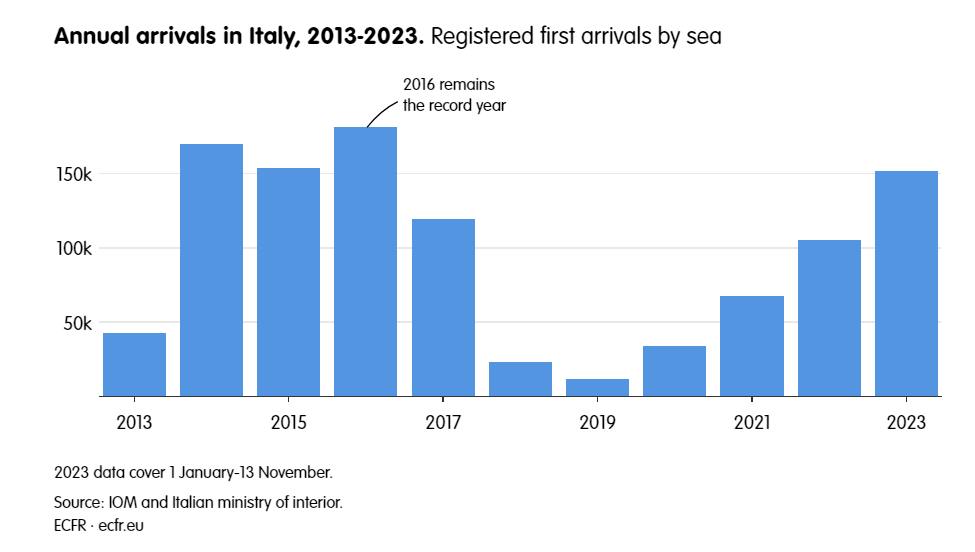Welcome to DU!
The truly grassroots left-of-center political community where regular people, not algorithms, drive the discussions and set the standards.
Join the community:
Create a free account
Support DU (and get rid of ads!):
Become a Star Member
Latest Breaking News
General Discussion
The DU Lounge
All Forums
Issue Forums
Culture Forums
Alliance Forums
Region Forums
Support Forums
Help & Search
General Discussion
Showing Original Post only (View all)UK's Rwanda bill is doomed for political failure [View all]

European governments should remember that not only does such a policy not work to deter migration—it will politically damage any party that adopts it.
https://www.socialeurope.eu/uks-rwanda-bill-is-doomed-for-political-failure

Diversity advantage: the colourful Lisbon neighbourhood of Mouraria is enlivened by a range of retail entrepreneurs, including from south Asia (Mauro Rodrigues / shutterstock.com).
When the British government first advanced its bill to send migrants offshore to Rwanda back in April 2022, the then home secretary, Priti Patel, promised it would ‘change the way we collectively tackle illegal migration’. Two years later and with the bill finally passed into law, the policy is a floundering disaster: it is unlikely to deter illicit migration, damages the global standing of the United Kingdom by violating international law and endangers refugees’ lives, all at huge financial cost. Nevertheless, Patel was disturbingly prescient. Germany’s own conservative party, the Chirstian Democratic Union, is now advancing its own Rwanda scheme, Italy is flirting over a similar enterprise with Albania and the European Commission is trumpeting comparable schemes across north Africa in the build-up to the European Parliament election. The idea has undeniably caught on, yet the Rwanda bill has not stopped regular or irregular migration. The most recent year-on-year statistics show net migration to the UK at a record high. On top of this, irregular migration rose by 17 per cent a year after the Rwanda bill was first unveiled as the ultimate deterrent for small-boat crossings of the English Channel.
Link to tweet
Extreme version
The Rwanda bill is, after all, just an extreme version of the failing externalisation policies which already dominate European migration policy. Externalisation policies aim to push border management on to a third country, thereby stopping and processing migrants before they cross into Europe. Over the past decade, Europeans have desperately and enthusiastically engaged in such deals with almost every southern neighbourhood country. It has cost Europeans tens of billions of euro, severely undermined their positioning as advocates of human rights, warped relationships with Europe’s southern neighbourhood and damaged other foreign-policy goals. Ultimately, it has not even stopped migrants arriving, but only caused more hardship and deaths en route. In Italy, for example, which has a policy of externalisation, the number of migrants who arrive irregularly has nearly returned to 2016 levels.

Not only has externalisation proven to be an unsuccessful way to regain control over migration, maximise migration’s benefits or mitigate its negatives, but a Rwanda scheme has already failed in Israel. Nevertheless, the British government has pursued the bill despite the UK Supreme Court unanimously declaring it unlawful, given the scheme’s propensity for refoulement—defying the legal principle that any asylum-seeker should not be returned to somewhere they’re at risk of harm. Instead, the British government put itself above the law, issuing a new bill to forcibly designate Rwanda a safe country while providing ministers powers to disregard inconvenient sections of international human-rights conventions. Given the UK’s founding role in the European Convention on Human Rights and a history of advocating for international norms, multilateralism and the rule of law, the bill has done more to tarnish the UK’s reputation than help the government ‘take back control‘ over migration.
‘Looking tough’
Given the Rwanda bill seems doomed to fail, it is worth asking why the idea is so popular among other European governments. European politicians across the spectrum seem to believe they must ‘look tough’ on migration to win votes and stave off the far right. This means adopting the right-wing framing of migration as a security threat and only challenging the finer points of how right-wing migration policies are implemented. But recent polling for the European Council on Foreign Relations reveals European politicians are trapping themselves in a migration hysteria of their own creation. Of the major crises Europeans feel most strongly about, migration polls beneath all others of the past decade. Those who are moved by immigration are mostly concerned about controlling arrivals, with data also intimating that populations become less concerned over immigration once they become more familiar with those migrating. The crisis Europeans feel most strongly about, by a significant margin, is in fact the economy—a crisis that migration can help alleviate.
snip
InfoView thread info, including edit history
TrashPut this thread in your Trash Can (My DU » Trash Can)
BookmarkAdd this thread to your Bookmarks (My DU » Bookmarks)
4 replies, 566 views
ShareGet links to this post and/or share on social media
AlertAlert this post for a rule violation
PowersThere are no powers you can use on this post
EditCannot edit other people's posts
ReplyReply to this post
EditCannot edit other people's posts
Rec (8)
ReplyReply to this post
4 replies
 = new reply since forum marked as read
Highlight:
NoneDon't highlight anything
5 newestHighlight 5 most recent replies
= new reply since forum marked as read
Highlight:
NoneDon't highlight anything
5 newestHighlight 5 most recent replies
Technically, those grounds for asylum were removed in an act last year, and the Tories rejected an amendment
muriel_volestrangler
Apr 27
#3